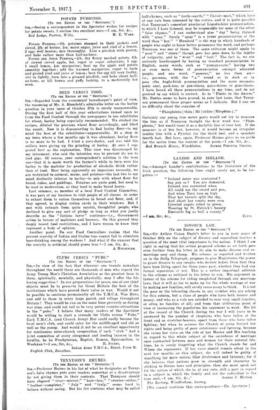DIVORCE LAW.
[To nu EDITOR or nu " flescrwroa."] Ste,—Sir Arthur Conan Doyle's letter to you in your paper of October 90th on the subject of divorce and separation touches a question of the most vital importance to the nation. I think I am right in eaying that his actual proposed scheme as set forth goes even further than his letter in its aim to make divorce and re- marriage easy and cheap. His scheme. as reported and written on in the Daily Telegraph, proposes to give Magistrates the power to grant divorce to any couples who declare before Glees that they have been living apart for three years past, whether they had any formal separation or not. This is u rather important addition to the scheme as outlined in his letter to you. His argument in favour of his scheme for riding roughshod through our marriage laws, that it will go far to make up for the whole wastage of war by making new families, will surely cause many to think. It is not the poor or the labouring classes in any number who are asking for this reform, but a class of people who have both leisure and money, and who as a rule are satisfied to rear very smell families, or often no families at all; and from that utilitarian point of view of increasing tho population his argument is weak. His hit at the record of the Church during the war I will leave to be answered by the number of chaplains who have fallen at the front and as stretcher-bearers, apart from those who have fallen fighting; but when he accuses the Church of going beyond her rights and being guilty of pure intolerance and tyranny, because she raises her voice on the side of her Master and His teaching in regard to this whole subject of the eacredness of marriage once contracted between man and women for their natural life- time, Ise is surely forgetting what the Church stands for and Whom she represents. If her voice should remain silent in the next few months on this subject, she will indeed be guilty of something far more serious than intolerance and tyranny; for if clue that nations grow in strength and character by sticking to Divine laws and principles, then else must speak out for the nation of which she is, at any rate, still a part in regard to a subject in which the family and not the individual is the true unit —I em, Sir, Re..' ALTRED J. Hurrow The Rectory, Windlesham, Surrey.
[We cannot continue this correspondence.—En. Spectator.]














































 Previous page
Previous page